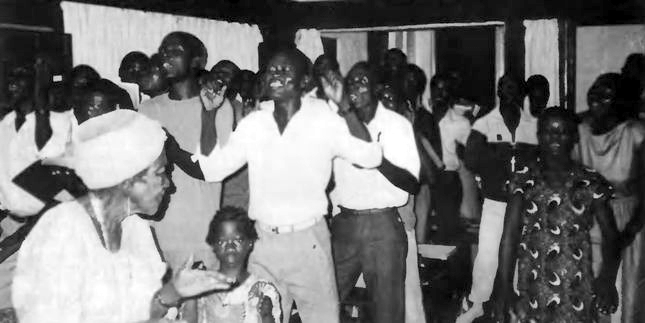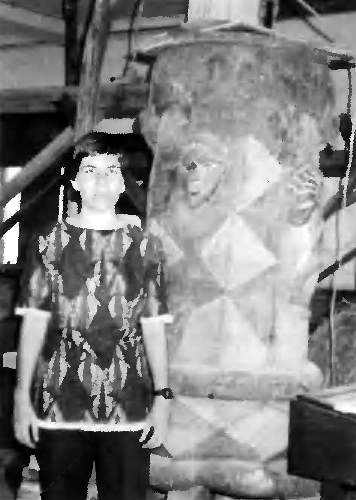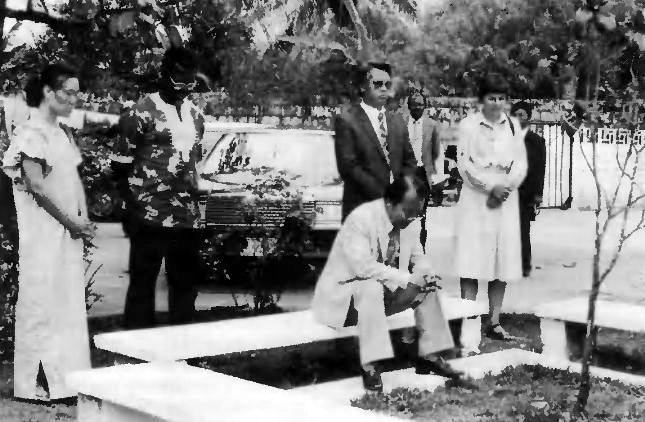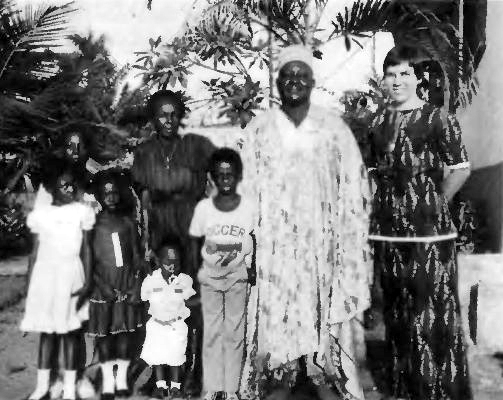![]()
The Words of the Peterson Family
|
|
The Words of the Peterson Family |

Center
members and home members, old and young, singing at a monthly
birthday celebration.
The first three Unification Church missionaries to Liberia arrived in the middle of 1975. Paula Peterson had originally been assigned to the neighboring country of Sierra Leone, but after being expelled, she joined the missionaries in Liberia. Fortunately they were able to incorporate the church and get permission for missionary residence by 1976, within just a year's time. She works together with Hideo and Kimiko Haga, their two children, and three other blessed members -- Liberian national leader Gerald Coleman, his Korean wife Chung Ja, and David Sumuwa, whose wife Elizabeth, originally from Zimbabwe, is now attending the Unification Theological Seminary.
Liberia is one of the small African countries located on the bulge of West Africa. To the west is Sierra Leone, Guinea is to the north, and the Ivory Coast is to the east. Liberia was founded in 1822 as a result of the efforts of the American Colonization Society to settle freed American slaves in West Africa. In 1847 it became a republic. The descendants of these freed slaves are called Americo-Liberians, who form the elite classes of the republic. There are approximately 22 indigenous tribes which comprise the balance of the population, totaling two and a half million. English is the official language.
Throughout Liberia's history, its politics have been dominated by the Americo-Liberians. The government is patterned after the American system of democracy, but differs significantly inasmuch as it switches back and forth between a multi-party and a single-party state. When we first arrived, the government was functioning under one party. Later, in 1980, there was a military coup headed by Master Sgt. Samuel Doe from an indigenous tribe. He and his government returned the nation to civilian rule, which gave more power to the native people. He wrote a new constitution and prepared the foundation for a new republic. In 1985 Sgt. Doe opened up the political process to the formation of r w parties and free elections. However, fearing that he might not win, he had the ballots counted in secret; he kept his power, and most of the seats in the legislature were given over to members of his own party. Between the election and the inauguration in January 1986 another coup was staged, but it failed. There was a great deal of bloodshed in Liberia in November and December of 1985. Currently there is still tension, because the opposition parties have formed a coalition, refusing to participate in the legislature and pressuring Sgt. Doe to resign. There are rumors that there will soon be another coup.
There is also a serious economic crisis going on at this time. Raw materials like iron ore, rubber, and timber are exported; there is very little manufacturing, and farming is done in the villages only on a subsistence level. Thus, the economy is import-intensive, which causes international money exchange problems. The job market is small, and the government, which employs 40,000 civil servants and dominates the job market, can only pay salaries every five months. Jobs are hard to find, even for those who have finished school or received special training. There is no system of compulsory education; people go only if they can afford it. Because of this the illiteracy rate is 85 percent.
Christianity is the major religion; Islam is a minority. Both exist alongside tribal traditions of ancestor worship and secret societies that conduct initiation rites for young people. There are also Sikhs, Hindus, Baha'is, Black Hebrew Israelites, Jehovah's Witnesses, and members of other various new religions.

Paula
Peterson at the National Museum in Liberia.
When we first started our work in Liberia we rented apartments or houses around the capital city of Monrovia. We tried street witnessing from the start and experimented with weekend workshops from time to time. It seemed that most people could not spend two days with us, so we offered one-day workshops. It was a protracted struggle for most of the native people to complete their education or find employment. Often they had to skip years of schooling because of their families' financial difficulties, and they would have to struggle even into their mid-20s to finish high school. Once they could get a job, their salary was not only for themselves but for their immediate family and other less fortunate relatives.
Because of such hardship, it was difficult for our spiritual children to dedicate themselves as center members. Sometimes their motivation to join our church was based on their desire to get food, shelter, security, medical coverage, scholarships, or job training. We had to be careful to make sure that their motivation to become center members was sincere. Even in the midst of such hardship, they had to have the heart to sacrifice or give up something in order to make a pure offering when they joined. On that foundation other blessings could come to them.
Most of our brothers and sisters go through many years of preparation as associate or home members before becoming center members. Besides our usual one-day workshops, we offer 2-, 7-, and 21-day workshops. We also have special 21-day internal guidance and actionizing workshops in which prospective members are taught about a life of prayer and faith, solving Adam-Eve and Cain- Abel problems, the history of the church, and Father's life. They also learn the significance of fundraising, witnessing, and lecturing, and they gain practical experience in these activities. Later they can attend a regional 21-day workshop where they learn Unification Thought and VOC theory. Then if they really want to dedicate themselves as center members they must pass through a 40-day trial period in the center; the brothers spend 20 days fundraising and 20 days on the farm, and the sisters spend 20 days fundraising and 20 days witnessing.
In Liberia girls don't have much opportunity for education. Boys in Liberian families are sent to school first, and girls have to wait in line.
Because of obligations in the home and childbearing responsibilities from their teens, girls take longer to get through school, and their ability to participate in our church activities is limited. Therefore, we have begun to experiment with ways of allowing them to be involved on a temporary basis. If they pass through all the workshops and the trial period satisfactorily, then they can move in. They have to sacrifice one year of school (usually the ninth or tenth grade) and live in the center, after which they can return to school. This has been quite difficult, so presently we have only three sisters in the center, as opposed to 17 brothers.
The well-to-do people of the society have close-knit families and are very tied to the established churches. They seem to be satisfied with what they have, so they rarely become dedicated center members. Very few of our members come from the upper classes.

April
1, 1986: Rev. Kwak, on his first visit to Liberia, prays at the
church center's holy ground. Left to right behind Rev. Kwak: Chung la
Coleman, Gerald Coleman, Hideo Haga, and Paula Peterson.
Last year we carried out a sign-up campaign in which 10,000 people signed cards stating that they agreed with the objectives of our movement; by so doing they became associate members. Thousands of these people had actually studied the Principle before but had not maintained connection to our church. We divided Monrovia into five zones and tried our very best with the few dedicated members that we had to recontact them, especially in the areas where our home members are concentrated. Six thousand signatures were collected by center members and 4,000 by home members. We completed the campaign just two weeks before God's Day 1986.
In 1986 we reorganized our center and created five different teams: for witnessing, fundraising, business, farm activity, and construction and maintenance. The witnessing team has seven members. At the beginning of the year they set up a 120-day condition to bring a certain number of active members. Our team members work in pairs in neighborhoods throughout the five city zones in the style of home church. Home contacts are encouraged to attend as many of our workshop programs as possible, from our intensive one- or two-day seminars up through our 21-day internal guidance workshop. We have experimented with dividing the 7-day workshop into two 3-day periods, from Friday through Sunday, for people who are working or have other commitments.
There are roughly 40 official members of our home member association, all of whom have graduated from at least a two-day workshop. Since we don't have many center members, we rely heavily on home members to carry out spiritual work. The association was revitalized in 1986; we installed a new constitution and new officers. Now the home members have their own witnessing and fundraising teams and are trying to have weekly internal guidance meetings. Centering on a zone witnessing leader, the members living in each zone cooperate in setting up lectures or video presentations in their homes or running miniature revival programs. This year the home members undertook a clean-up campaign. City Hall is trying hard, but it just cannot keep up with garbage collection, so Monrovia has a terrible garbage problem. The home members took responsibility for the dirtiest areas of their respective zones.
Every year Liberia has a national day of prayer and fasting. On that day and on other special occasions center members go to their zones to pray with their home members. Center members are also encouraged to visit home members who are in the hospital. If certain home members don't come to Sunday service, the zone leader and his active members are responsible to visit them, to encourage them to come, and to find out if they have any problems they can help with. The home member association is still young, but it has many plans that it is trying to put into action; it covers all its own expenses through fundraising.
We have sent out pairs of 40-day pioneers to several cities. Because we do not have enough well-trained manpower to spare, we have not been able to establish any permanent pioneer centers.
Our overall witnessing goal for 1986 is to end the year with a four- country revival tour. This is currently being organized.
At the beginning of this year I visited the Ministry of Education because we wanted to find out if we could teach the Bible in the public schools. As it turned out, not only were various missionaries already giving Bible instruction, but the Ministry was undertaking to design and implement a whole new religious education curriculum. I became a friend of the assistant to the minister of education, who is in charge of curriculum development. He wants the churches to supply proposals and materials, so I offered an outline of the CAUSA Worldview, Unification Perspectives on Christian Faith based on Rev. McCarthy's video lecture series, and the Islamic Perspective of the Principle.
Our fundraising team has only two members, and they use primarily ginseng products. Although the economic situation is bad, people are willing to buy health products. We sell small quantities, such as packets of tea for 50 cents each, which the people can afford. Occasionally they are able to afford larger quantities. We offer other products as well, but because people don't have much money, these are usually the real necessities of life. Sometimes we make our own products, such as T-shirts or little yarn doilies. The market in the city here is limited to a few hundred thousand people, so we have to change products continuously.
Our business team is running our ginseng store called "Happy World" Chung Ja Coleman and two Liberian members work there. Recently we moved to an excellent new location on the main street in town. We have more space and can even accommodate a small cafe right within the store where people can drink ginseng if they like. At this point Liberia is selling more ginseng than any other African nation, and we are investigating ways to further expand the market, such as wholesaling some of the cold drinks.

Paula
Peterson with a home church family.
Our construction and maintenance team of three brothers is responsible to keep our center, which is an old building, in good repair. The plumbing, wiring, and fixtures need constant work, and the roof needs to be replaced. Recently they completely restored a small servants' quarters in the yard, which can be used as an apartment, a small workshop site, or an office for future business projects.
Our farm is located in a place called Clay Ashland on Bushrod Island, just north of Monrovia. It has 44 acres, only six of which have been cleared so far. That was a lot of hard work for our small team of four brothers; this is only the second season they have been working there. Unfortunately the water is not good for washing or drinking, so good water has to be carried in. During the first season the team basically experimented; this year they are planting four acres of casaba, which is a starchy root and one of the staple foods in Western Africa. Along with this, we are growing in smaller areas some other cash crops, which we plan to sell. We hope to replace all the money invested in the farm and expand its operation in the future. Someday we would like to build a training center there.
In 1984 the first CARP chapter was officially established on the Cutting- ton University campus. The CARP members held a weekend workshop there to get the campus activity underway. Currently they are pioneering a chapter at the University of Liberia in Monrovia, but that campus is often closed down because of political unrest. CARP in Liberia wants to be open to people of all faiths and to help minimize the existing tension between Christians and Muslims. Last year CARP was able to send one representative to the Tokyo CARP convention; this year a larger delegation will go to the New York convention.
Many of our most enthusiastic home members are junior and senior high school students, and we are hoping that they can be increasingly active on their school campuses. One young brother set up a YES (Youth for an Ethical Society) chapter at his junior high, and has already found several spiritual children. The president of the home members' association was formerly the head of another Christian youth group that has chapters in three cities. Slowly but surely he is bringing its officers and members to workshops and gaining support for YES. The members of YES would like to involve as many campuses as possible in their programs.
This is a glimpse of the overall situation in Liberia. The members are working very enthusiastically. The older members who were flagging from the slow development of the movement are inspired by the young members who are joining now. Hardship in different forms has come to the people of Liberia, but a big blessing can follow.
The completion of the 40-year wilderness course and Father's sacrificial condition in Danbury, as well as conditions made by Heung Jin Nim in spirit world and members on earth, have made a big difference in the spiritual situation of Liberia and in particular helped us to achieve our goal in the campaign for associate membership. The spiritual world is much more ready to work, even on the basis of small conditions. The year 1985 looked quite bleak; many Liberian citizens suffered and shed blood. Now a spring has come; 1986 feels like the dawn of a new day. The movement in Liberia has really started to take off. We know this is because of the sacrifice of True Parents, Heung Jin Nim, and brothers and sisters in Liberia and throughout the world.